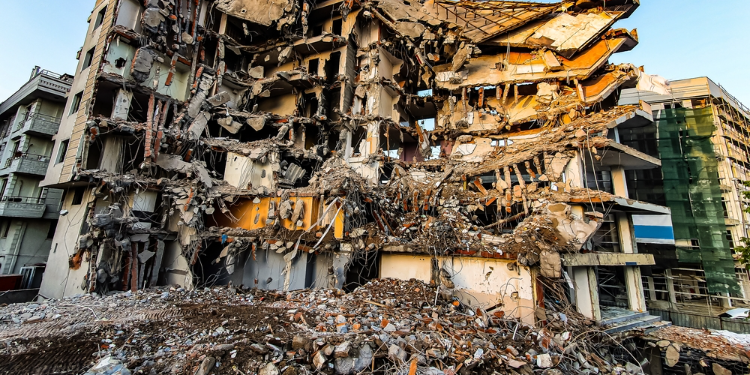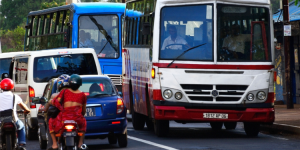
The tragedy that recently struck Turkey and Syria is a stark reminder of how some locations lie within the planet's most active seismic and dangerous zones. While the odds of finding survivors are getting slimmer as the days go by, the task of reconstruction seems insurmountable at all levels. So what should you consider as an expat in an earthquake-prone country? Should you move there at all?
Which countries are at risk of earthquakes?
Along with volcanoes, earthquakes are the manifestation of tectonic plates. The planet has 53 tectonic plates, which, far from being static, move, deform, rub, and collide with each other. These displacements can cause earthquakes, and the seismic risk is the meeting between the probability of a natural disaster (randomness) and the populations exposed to this phenomenon. Because of its unpredictable nature, an earthquake cannot be anticipated, but seismic standards have been established to help increase the resistance of infrastructures and thus mitigate the impact of earthquakes on people. But earthquakes can cause other natural disasters, such as volcanic eruptions, fires, or tsunamis.
In recent years, most seismic epicenters have been located along the Pacific Rim and the Caribbean ring. Regions along the border of the African and Eurasian continents have also been affected. But the truth is that no area of the globe is safe from seismic risk. The degree of impact varies from one region to another. Every year, more than 500,000 earthquakes of magnitude 6 or more (the level of a potentially destructive earthquake) are recorded on average.
While admitting the limitations of their work, seismologists are striving to detect the next major disaster. California, Japan, Nepal, Indonesia, Australia and Southern Europe are all likely to experience major earthquakes. Seismologists humbly point out that it is impossible to determine when these events will occur. The margin for error remains wide, and other countries could indeed be affected by these natural disasters.
What should expats consider when settling in?
Housing
Housing requires a lot of attention. In Nepal, many houses do not meet anti-seismic standards. In case of an earthquake, the most fragile infrastructures collapse, worsening the disaster. The same goes for Myanmar, where while the population density is increasing, buildings are being built on weakened soils.
On the other hand, Japan has become a model for anti-seismic construction. The government has agreed to invest massively (more than 10,000 billion euros) in the prevention of risks linked to earthquakes. In fact, the country has no choice! Every year, about 20% of the most important earthquakes occur in Japan. This so-called "disaster economy" is largely based on the construction of earthquake-resistant infrastructures that help at reducing human and material casualties during natural disasters.
While property prices are crucial for expats looking to buy property abroad, living in a high-risk seismic zone also implies checking the geographical location as well as the condition of the property. Does it really meet anti-seismic standards? Is it a new property or an old one? Keep in mind that even in leading Japan, some buildings do not meet the standards. There is always the risk of substandard construction or poor craftsmanship.
Safe zones
Governments usually provide for safe zones, but this is not always the case. Some countries are less prepared than others and do not have a plan that indicates safety zones by neighborhood. Conversely, in South Korea or Japan, it's typical to have signs that point to and mark evacuation zones.
Information networks
Information is the best kind of prevention. California, for example, has set up an evacuation plan in case of an earthquake. Although less affected, France has developed its own system to assess the risk according to its geographical areas. Other countries prone to natural disasters have also developed alert applications. In Japan, Yukureru is one of the most popular earthquake alert systems. Safety Tips provides information about this type of natural phenomenon and what to do in case of danger.
In any case, make sure you are aware of the programs that are in place in your area. Sign up for registries, and notify your municipality and the neighborhood of your presence. Participate in simulations, such as evacuation drills that are planned in schools and businesses.
How to stay safe in an earthquake-prone country
Before the earthquake
Identify potential shelters in the house (under tables, for example) and areas at risk (windows, hanging furniture, etc.). Repair or replace all loose or wobbly items. Beware of objects that are not sealed to the walls. Each room should have its own fire extinguisher. Have one or more flashlights in working order in strategic locations in the home. Identify the gas, electricity, and water sources, and get to know how to shut them off. In doubt, ask your landlord.
Make copies of your important documents. Keep them in a safe place. Send yourself some copies by e-mail. Prepare a "survival kit", including a cell phone, chargers and portable battery, batteries, flashlight, non-perishable food, water bottles, sleeping bag, clothes and shoes, important documents, cash, map, names of important contacts, including your embassy, first aid kit, radio, etc.
During the earthquake
Remember one rule: get down, shelter yourself, and hold on.
If you are indoors, get on the floor, seek shelter under a protective structure, and hold on to something solid (e.g., table leg). Stay away from windows or anything that could fall. Protect your head if you can't lie down under a protective structure. If you are outdoors, move away from buildings, trees and power lines. Protect your head at all times. If you are driving, pull over to the side of the road in an open area. Keep your seat belt on. Do not attempt to get out if electrical wires have fallen on your car.
After the earthquake
Follow the instructions from the authorities (keep listening to the radio). An earthquake can cause aftershocks, so stay calm at all times. Take care of your injuries and those of others with you. Use your phone only for emergencies.
All this doesn't mean that you should not move to a seismic zone. Even though earthquakes are quite likely to happen, they do not necessarily affect the lives of everyone. Everyday life goes on, and it is business as usual. In fact, you will soon learn about the locals' resilience and how to integrate this risk into your everyday life as an expat.
Useful links:
US: Federal Emergency Management Agency
California Department of Public Health: emergency preparedness office
California Governor's office of emergency services: staying safe where the earth shakes (pdf)
Apps in Japan: Yukureru (android); Safety tips (Android, Apple)



















